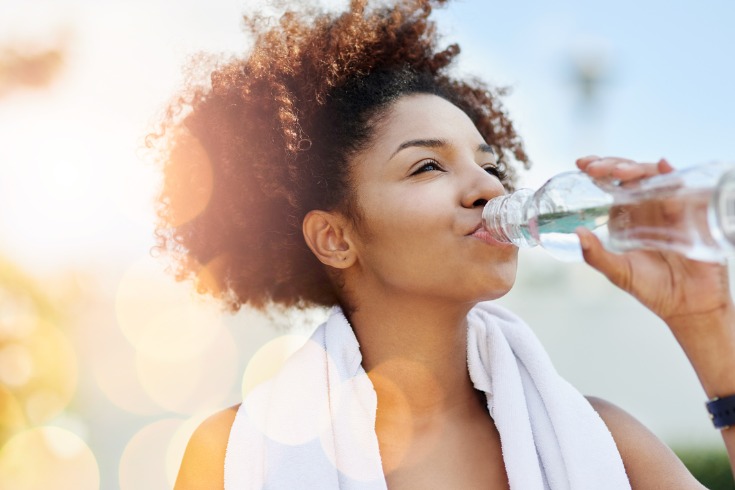
How much water is enough? It’s been a hotly debated topic amongst health professionals for many years. While everyone agrees that water is an essential part of a healthy balanced diet, it’s about finding the right balance.
Why Our Bodies Need Water
The human body is made up of between 50-80% water, higher in infants and lower in elderly people. We require water for digestion and absorbing nutrients, to help the body move, regulate body temperature, cushion the brain and joints and process waste products. Water helps transport oxygen around the body and when our water levels are low, we may not perform at our physical and mental best.
When the body is dehydrated, it doesn’t function as well and is at risk of developing kidney stones, heart valve problems and some cancers. We lose water daily through sweating, breathing, urine and faeces so our water needs replenishing daily. The human body can only survive three to four days without water but about three weeks without food.
Recommended Adult Daily Water Intake
Most people will tell you the recommended daily water intake is eight glasses of water but there’s actually no science behind this. No one knows the origins of the recommendation but it could be as early as 1945 when a nutrition organisation suggested the average person should consume 1ml of water per calorie of food. It was simply a rule of thumb – eight glasses of eight ounces of water (237 ml) which equates to roughly two litres per day.
In 2004, the U.S. National Academies of Sciences, Engineering, and Medicine recommended an adequate daily fluid intake, including beverages and food, of:
According to research by Harvard University updated in March 2020, water intake must be individualised. A person’s water intake needs vary depending on their body weight, their life stage, the temperature outside, level of exercise, illness and any medications they take (some cause water retention while others have a diuretic effect).
Letting thirst be a guide of when to drink is a good way for most adults to stay hydrated. However, this can be risky for elderly people who often don’t feel thirst, so if in doubt try and stick to the recommended intake.
FAQs About Water Intake
Most of us appreciate the importance of staying hydrated, but you may have some questions about your water intake.
How does hydration affect your health?
Every cell, tissue and organ in our body relies on water to function properly. Your heart doesn’t need to work as hard when you’re well hydrated. A lack of water means there’s less blood in the body which can lower blood pressure and raise the heart rate. Water helps the kidneys remove waste and ensures they aren’t clogged up with proteins called myoglobin. Staying well hydrated can even help you lose weight. Many people misinterpret hunger pains for thirst. Drinking water more often leads to consuming less fat, sugar, salt and calories.
What happens to your body when you drink more water?
Soon after we start drinking a glass of water, the brain tells the body it has had enough to drink so we don’t over hydrate. The water travels to the stomach where, unlike food, it is absorbed into the bloodstream rather than digested. The speed of the absorption will depend on the contents of the stomach. Water travels to cells across the body providing hydration and assisting with daily function.
Kidneys use water to filter toxins and then expel around 20% of the water we drink through urine. Water also flushes water soluble vitamins and minerals from the body. More water leaves the body through sweat, our breath and stools which consist of 75% water.
Can you get your fluid intake from something other than water?
Yes, other fluids like tea, coffee, milk and juice count towards your water intake. Also, around 20% of our water intake comes from water-rich foods such as fruits, leafy greens, celery, cucumber and capsicum.
Can you drink too much water?
While it’s rare, it is possible to ingest too much water. Water intoxication can occur resulting in the body’s salt and electrolytes levels being too diluted. Overhydration can also cause hyponatremia where sodium levels fall to dangerously low levels. We need sodium for fluid balance, blood pressure control and to assist the muscles and nerves. Where sodium levels are too low, it allows extra water into cells making them swell.
How can you tell if you’re getting enough water?
The body gives you a few clues when it’s not getting enough water. Urine is darker than normal or there’s little to no urine, a dry mouth, feeling sleepy, headaches, confusion, dizziness, dry mouth and feeling thirsty.
You can use a urine colour chart to check you’re hydrated. Ideally your urine should be pale, odourless and plentiful. So if you’re drinking regularly and your urine matches the colour chart, it’s most likely you’re getting enough water.
If your organisation would like to know more about our Nutrition Support program, call PeopleSense by Altius on 1300 307 912 or
contact us online.